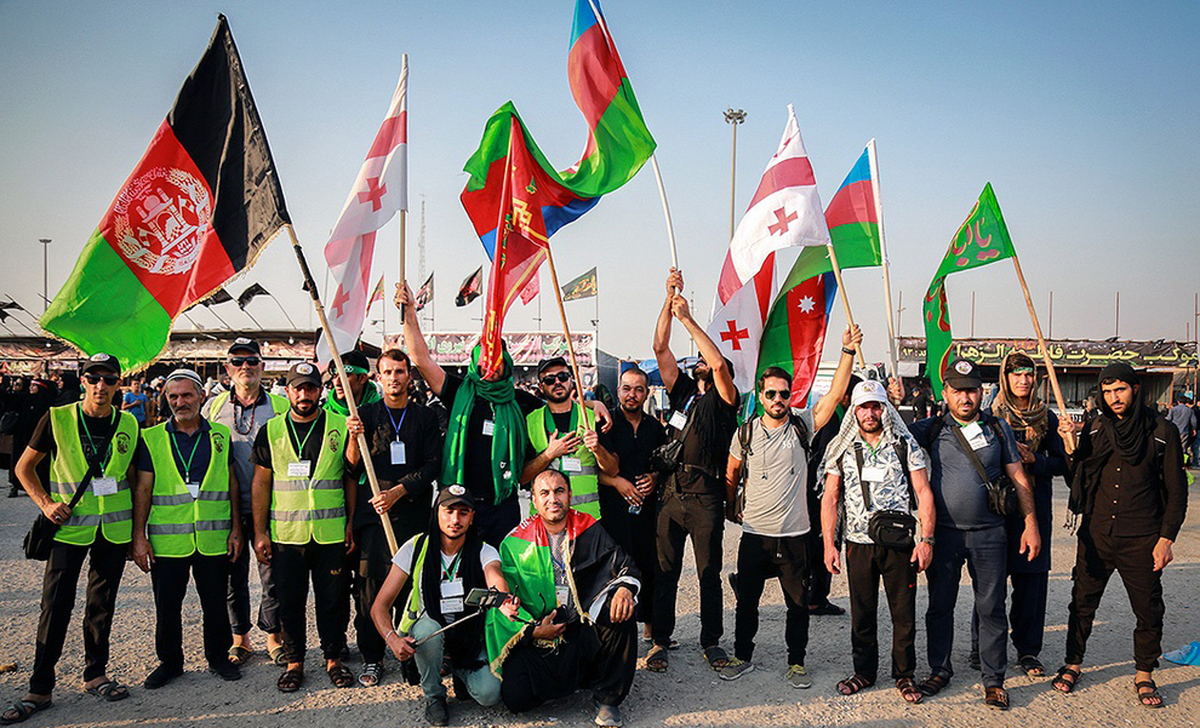In The Name of Allah, The Beneficent, The Merciful. Sending our greetings of peace, prayers and salutations upon the Master of the Martyrs
Peace be upon the choicest confidant of Allah, and the son of the choicest confidant!
Peace be upon the hostage surrounded by the tightening circle of sorrow and grief, killed by a horde of savages.
All religions have their martyrs, for the Shia Muslims they come from the distant past of Karbala. Almost 1400 years later, the Day of Arbaeen is remembered by millions of people around the world. It is marked as a day to pay tribute to the sacrifice of Hussain Ibn Ali for social justice.Arbaeen is a Shia Muslim religious observance that occurs forty days after the Day of Ashura to commemorate the martyrdom of Imam Hussain, the grandson of Prophet Mohammad (PBUH). Large crowds visit the shrines of Hussain Ibn Ali and his half-brother Abbas Alamdar in Karbala, where they were killed in an uprising against the tyrant Umayyad ruler Yazid Ibn Muaviyah.
It is possible that the visitation of Jabir on the 20th of Safar was a coincidence and that the 40th day had no significance. However, there is spiritual significance to some numbers and this is seen in the Qur’an and the traditions such that the number forty is repeated in some verses:
“And when We made an appointment with Moses for forty nights. Then you took the calf after him, while you were wrongdoers.” The Quran, 2: 51
“Then indeed, it is forbidden to them for forty years [in which] they will wander throughout the land. So do not grieve over the defiantly disobedient people.” The Quran, 5:26
“And We made an appointment with Moses for thirty nights and perfected them by [the addition of] ten; so the term of his Lord was completed as forty nights. And Moses said to his brother Aaron, Take my place among my people, do right [by them], and do not follow the way of the corrupters.” The Quran, 7:142
In recent years annual Arbaeen Walk has become a talking point.Provision of services and hospitality during the Arbaeen visitation has won world heritage status, joining UNESCO’s culture list as one of the most prominent social and cultural characteristics of the Arab nation to cherish the religious event. Arbaeen Walk has been widely described as the biggest annual gathering with participants from across the globe. The crowd has been swelling each year.Millions of black-clad Shia pilgrimsproudly hold aloft flags of their respective countries and march in unison. Walking in long columns stretching back unbroken foralmost 80 kilometres, sleeping and eating in tents erected by supporters beside the road.
Shia cities, towns and villages empty out during a twenty day period as their people take to the roads in an organised and well protected mass movement not seen anywhere else in the world.The people of Iraq open their hearts for pilgrims despite their own economic problems. Estimates vary of the total attending, from 12 to 17 million.In Najaf, where the walk begins, at least two weeks before the date of Arbaeen, associations set up temporary facilities or reopen more permanent ones along the pilgrimage routes, including prayer halls, guest houses and stands offering various services.Along the way from Najaf to Karbala, stalls had been set up by local residents, charities, mosques, and foreign aid groups to ensure no guest goes hungry or thirsty. Cooks prepared vast quantities of stewed lamb, grilled fish, beans, fresh bread, and rice. There are small makeshift tents lined with foam mattresses and blankets for people to rest or sleep.These people have redefined the whole concept of hospitality, where a host takes honour in serving his guests who are complete strangers to him.Some save money every month from theirscant earnings to spend them on guests during Arbaeen.
Arbaeen pilgrimage is a characteristic spiritual exercise in which hundreds of thousands of Shia and Sunni Muslims, even Christians and Zoroastrians, etc. from various nationalities participate. According to the UN cultural body, the trend is a social practice performed across the central and southern regions of Iraq, from where processions of visitors and pilgrims converge towards the holy city of Karbala. The tradition is a social practice with deep roots in the Iraqi and Arab tradition of hospitality is an immense display of charity through volunteering and social mobilization and considered to be a defining element of Iraq’s cultural identity.
A Syrian Christian thinker Antonio Bara said:
“Imam Hussain in not exclusive to Shi’a or Muslims but belongs to the whole world because he is the CONSCIENCE of RELIGIONS.”
The writer is a traveller and freelance writer based in UK. He has previously written for @the_nation @Dawn_com @DunyaNews @TheAsians He can be contacted on Twitter @SyedIHusain

